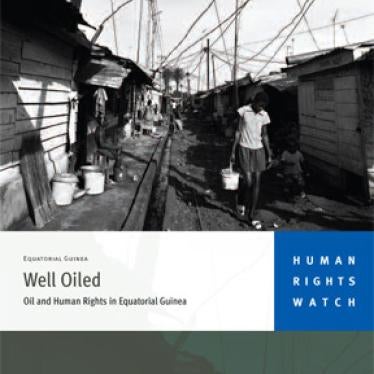Human Rights Watch welcomes the Human Rights Council's review of Equatorial Guinea in December 2009 and its March 2010 adoption of the UPR report. As one of several human rights defenders from Equatorial Guinea stated before this body in March, "We cannot afford the luxury of letting these recommendations become window-dressing for the Equatorial Guinea government."
Importantly, the delegation from Equatorial Guinea accepted nearly all of its UPR recommendations. While we regret that it ultimately rejected some recommendations—those pertaining to the abolition of the death penalty, ratification of the Rome Statute, election reform, and access for the UN independent expert on torture to visit military facilities—the government endorsed more than 100 others. Among other commitments, it pledged to end torture, arbitrary and secret detentions; assure the independence of the judiciary; advance social and economic rights by prioritizing poverty alleviation and fighting corruption; and respect freedom of expression, assembly, and association.
Since its UPR review, however, the government has produced empty rhetoric and continued abuses rather than real improvements. It has sought to enhance its international image through a major public relations push while continuing to disregard economic and social rights, harass civil society activists, impose severe restrictions on freedom of expression, and carry out grossly unfair trials. Such developments contradict the basic commitments made by Equatorial Guinea during the UPR.
For example, as reported by Amnesty International, Equatorial Guinea abducted four nationals living in exile in Benin in early 2010, held them in secret detention where they were tortured and forced to confess to participating in a February 2009 attack on the presidential palace, and then executed them in August following a summary military trial that violated international human rights standards and the country’s own laws. The trial and execution were strongly condemned by the UN Working Group on Mercenaries. The Equatorial Guinea government also arbitrarily detained ten opposition politicians and dozens of Nigerian fisherman and traders, accusing them of participation in the same attack. In another travesty of justice, seven of the Nigerian citizens were prosecuted in an unfair civilian trial in March 2010 and sentenced to 12 years while two Equatoguinean opposition members who were acquitted in that trial were retried in August by a military court and sentenced to 20 years in prison.
These are not the actions of a government that is honoring its UPR commitments. We therefore repeat our call for all governments to insist on the creation of a vigorous, transparent, and participatory follow-up mechanism to translate the UPR recommendations into meaningful action to improve conditions for the people of Equatorial Guinea.





